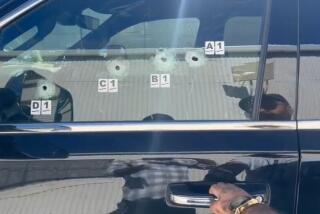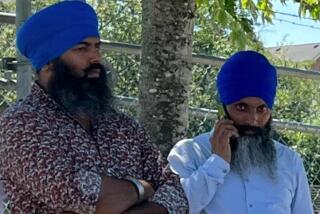Thousands of Sikhs Protest Clinton’s Words on Punjab
- Share via
NEW DELHI — Police used water cannon and tear gas to disperse thousands of angry Sikhs who burned President Clinton in effigy Tuesday to protest his published remarks about their troubled homeland.
The marching demonstrators, estimated by police to number 15,000, were halted by three lines of barricades about a quarter-mile from the U.S. Embassy. When they tried to force their way through, police charged them with metal-tipped sticks.
After some marchers kept surging forward, officers opened up with high-pressure water hoses and tear gas.
The carefully organized protest was swollen by 250 busloads of pro-government Sikhs brought from Punjab by India’s ruling party to show support for the government’s position in its struggle with Sikh militants. Since the early 1980s, Sikh separatists have battled the government for the establishment of an independent homeland in Punjab, the breadbasket state in northwest India that is the cradle of Sikhism.
The demonstration was the third, and largest, in New Delhi to be aroused by a diplomatic unpleasantness that most Americans likely have not even heard about.
On Dec. 27, Clinton wrote a letter to U.S. Rep. Gary A. Condit (D-Ceres) that, according to the Indian press, mentioned “chronic tensions between the Indian government and Sikh militants” and the need to safeguard “Sikh rights” in Punjab, where Sikhs make up 60% of the population.
The White House dispatched another letter bearing Clinton’s signature to a Washington lobby for Kashmiri separatists, saying Clinton was ready to work with the group to find a solution to the insurgency raging in the Indian state of Kashmir.
The sensitive Indian press learned of the letters and, to the bewilderment of many U.S. officials, raised a storm cloud of protest, seeing in them tangible proof that Washington was meddling in the country’s internal affairs--or, worse, was intent on breaking this fractious country apart.
The Foreign Office then displayed its displeasure by issuing a statement saying it was “not ready to accept external prescriptions” on human rights and democracy.
India’s ambassador to the United States, Siddhartha Shankar Ray, met on Jan. 24 with Assistant Secretary of State Robin Lynn Raphel in Washington to object to what he termed Clinton’s provocative and unacceptable remarks, according to the Indian press.
New Delhi’s reaction--especially to the letter on Kashmir, which to American eyes appears noncommittal and which knowledgeable Indians say was probably drafted by a low-level clerk and signed by machine--revealed how tentative U.S.-Indian ties remain.
“There is, in fact, a new recognition here that the U.S., while not an outright enemy, can no longer be depended on as a dependable ally,” concluded New Delhi commentator Ajoy Bose.
“They don’t have a clue how Washington works,” was the acerbic conclusion of one high-ranking American diplomat here.
On Tuesday, after the protesters were doused and gassed, a 30-member delegation including three members of Parliament and the leader of the Punjab branch of India’s ruling Congress Party was allowed to present a letter to the U.S. Embassy criticizing Clinton’s comments.
The letter, quoted by the United News of India agency, pointed out that Sikhs enjoy equal rights with majority Hindus under the Indian constitution.
More to Read
Sign up for Essential California
The most important California stories and recommendations in your inbox every morning.
You may occasionally receive promotional content from the Los Angeles Times.













